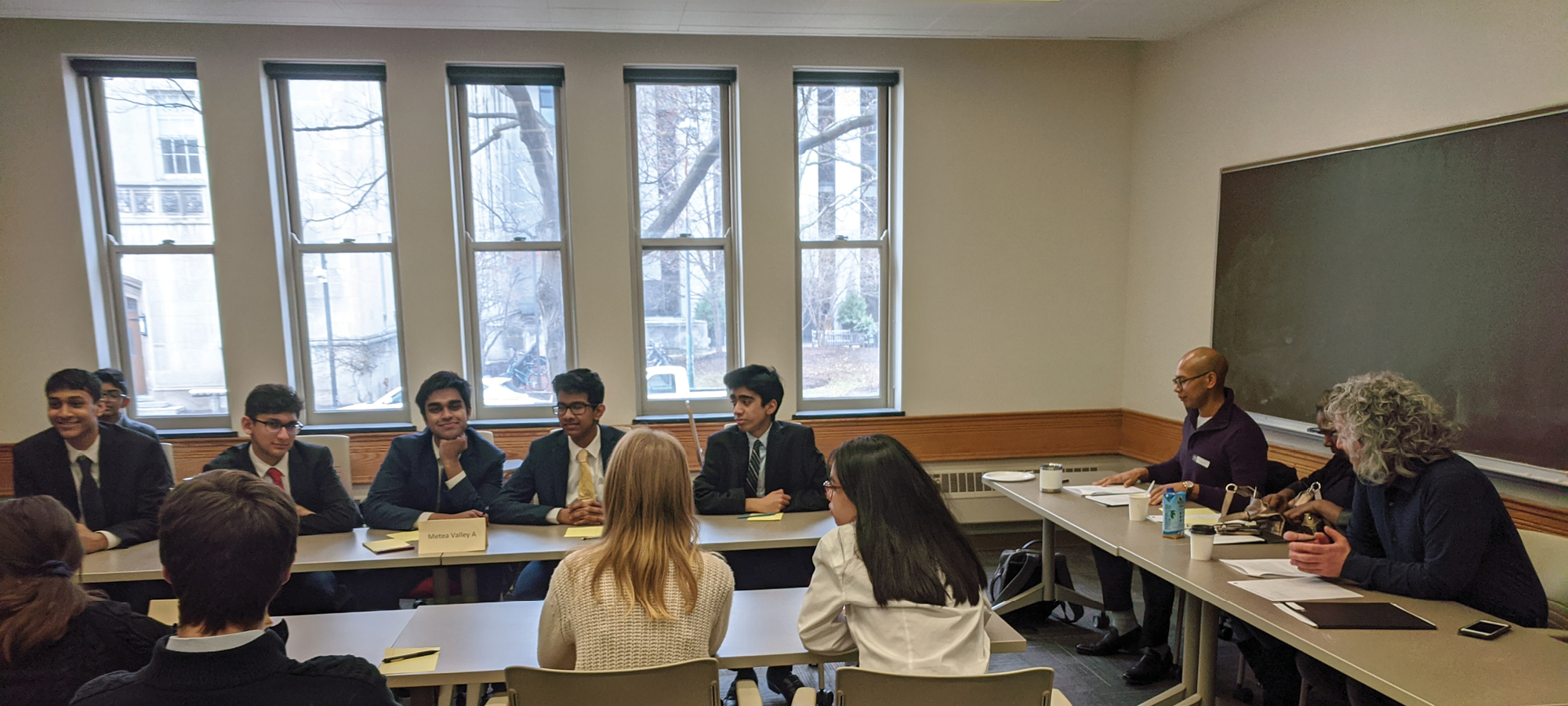
Students face off at the fifth annual Chicago Regional High School Ethics Bowl. Unlike debate, teams don’t take opposing stances on issues. In fact, they can score points by helping to clarify and deepen their opponents’ arguments. (Photography by Bart Schultz, PhD’87)
Winning Words prepares high schoolers for an epic ethics competition.
“Is it disrespectful to the victims of slavery to celebrate a wedding on a former slave plantation?” asks Jacob Blitz, Class of 2020, in a Cobb Hall classroom. He’s not posing the question to classmates or a professor. He’s addressing two teams of high schoolers at the fifth annual Chicago Regional High School Ethics Bowl competition.
Held on the Saturday before the Super Bowl, the event is about scoring points through feats of intellect and persuasion rather than physical prowess.
The team from Walter Payton College Preparatory High School has already won the coin toss and opted to go first. After rereading the case (the teams have seen it before in practice) and discussing it among themselves for the allotted two minutes, the three team members advance their position: the wedding plan is unethical, especially since the case specifies that the couple is aware of having family who benefited from the plantation’s history of slavery.
In a response period, the opposing team from Daniel Hale Williams Preparatory School of Medicine—a Bronzeville public school—pushes them to clarify their view. Would the wedding be acceptable if this particular plantation never had slaves, or does the broader legacy of the plantation system spoil the idea inherently? Should the couple consider how the choice of venue affects their family members and other guests?
Later, in a round of questions from judges, UChicago philosophy PhD student Kévin Irakóze pushes further: “Should the houses be abandoned, should they be burned?”
Not necessarily: the plantation could be converted into a museum, akin to a Holocaust museum, the Walter Payton team suggests.
Ethics bowl is not a debate. Teams do not start with a conclusion and work backward to justify it at all costs. They formulate a position in real time, refining their viewpoint by considering challenges from the opposing team and from a panel of judges. The opposing teams need not have opposing arguments; they can gain points by helping add nuance and depth to each other’s views. As the scoring guidelines state, “Listening to the other team with an aim to affirm, supplement, or build on their argument is a prudent approach.”
In other words, functional civil society.
High school ethics bowls are relatively new: intercollegiate competitions came first, in the 1990s, with high school contests following in 2012. Today the National High School Ethics Bowl championship, held annually at the University of North Carolina at Chapel Hill, draws teams from 39 regional competitions around the country, including the one in Chicago.
Ethics Bowl was the brainchild of Illinois Institute of Technology (IIT) philosophy professor Robert Ladenson. But the current vibrant high school ethics bowl scene in Chicago can be traced largely to the work of one UChicago faculty member: Bart Schultz, PhD’87, senior lecturer in philosophy and director of the Civic Knowledge Project (CKP). Schultz leads CKP’s Winning Words program, which prepares students for ethics bowl competitions, in collaboration with Kelly Laas, librarian/information researcher at IIT’s Center for the Study of Ethics.
Winning Words mobilizes its interns, mostly College students, to foster philosophical conversation among students as young as second graders, with a focus on underserved communities on the South Side. Instruction sites include public schools, as well as the Laboratory Schools and XS Tennis, a mission-driven sports facility located a few blocks west of Washington Park.
Socratic in outlook, Schultz enjoys bringing philosophy to the people. “The marketplace, the tennis court,” he says with a laugh, “there are all sorts of opportunities.”
Schultz says that in the 2019–20 academic year more than 100 high school students participated in ethics bowls in Chicago, representing a dozen schools. Some teams are seeded by the Winning Words program and then run more or less independently. But for many teams, the Winning Words interns are a critical resource.
Ira Abrams, AB’90, an English teacher at Daniel Hale Williams, praises intern Gabriel Sánchez Ainsa, Class of 2022, for his work supporting a group of engaged students who formed a team this year: “Rain, snow, or shine he bused it out to 49th and Wabash to meet with us every week, … and miraculously, all seven students stuck with this weird activity all the way through the regionals at the beginning of February.”
Senior Takeisha Washington appreciated the effort and her ethics bowl experience: “It gave me more insight into what it means to be in a competitive academic environment.”
For a handful of teams, the road to regionals included a practice round hosted on South Campus the previous week by UChicago’s Office of Special Programs–College Prep. After an overview of college readiness resources by OSP–CP director Dovetta McKee, the teams sharpened their skills in some scrimmages: Is it disrespectful to walk a dog in a cemetery where no one has been buried for decades? Should the state impose chemotherapy on a 17-year-old patient who refuses treatment? They’ll face some of these questions in the real competition, but they don’t know which ones.
When it came to regionals, only one team could emerge victorious: after several rounds full of note-taking, huddled discussion, and sallies of dialogue—plus a lunch break for pizza—Walter Payton College Prep had broken away from the pack. They went on to best the winner of the Indiana regional competition and would have headed for nationals in the spring, had the event not been canceled due to COVID-19.
Schultz is now working to develop smaller, more experimental ethics bowl events (XBowls) that would help prepare students for the regional contests, while also recruiting students to perform at an international philosophy conference in summer 2021. Meanwhile, teams around Chicago are revisiting their playbooks and hoping to kick off next year with new recruits.
